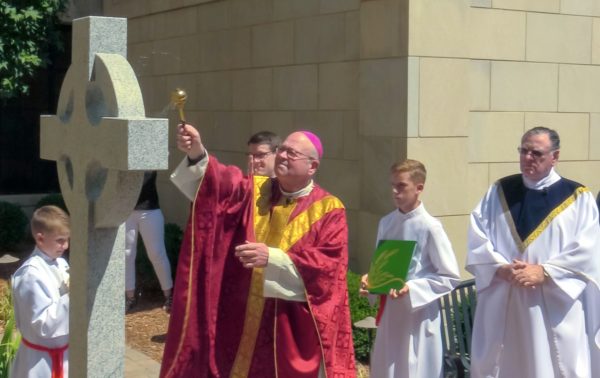Irish priests who served the diocese honored

Bishop Carl A. Kemme blesses the Celtic cross after a noon Mass Wednesday, Aug. 24, at the Cathedral of the Immaculate Conception in Wichita. The cross is in the Cathedral’s interior garden area. (Advance photos)
Bishop Carl A. Kemme likened the priests of Ireland who left home and family to serve the faithful of Kansas to St. Bartholomew whose missionary travels took him far away from home.
“He took his faith and did something with it,” the bishop said in his homily during the noon Mass Wednesday, Aug. 24, at the Cathedral of the Immaculate Conception in Wichita. “He served the Lord to the best of his ability and he gave his life for the gospel, for the Master.”
Cross honors more than 70 priests from Ireland
Bishop Kemme then explained that he was going to bless a Celtic cross in the Cathedral’s garden after the Mass, a cross dedicated to the memory of the more than 70 Irish priests who left their homes for a new home.
“They served as missionaries, teaching, preaching, and administering the sacraments. We as a diocese owe so much to these men. We are who we are today in large part because of them.”
Bishop thanks the Hanrahans
After thanking Pat and Renee Hanrahan, who spearheaded the idea of honoring the Irish priests with a memorial, Bishop Kemme said the cross is “beautiful testament to this gift of their faith and this gift of their missionary zeal and service.”
Referring once again to the day’s Gospel, the bishop closed his homily by imploring that St. Bartholomew inspire the faithful “as Pope Francis says, to go forth with the gospel, to be unafraid to take the good news of Jesus Christ to near and far, to whomever the Lord will send us, and to preach the good news of Jesus Christ as he did, as all the apostles did – and as our Irish missionaries did so faithfully and so lovingly.”
After blessing the cross, Bishop Kemme explained at a luncheon in Good Shepherd Hall how the scores of Irish priests made a profound difference to the Diocese of Wichita. In a twist of history, he said, the faith of Ireland that sent so many missionaries to Kansas has weakened to the point where the Emerald Isle is in need of missionaries.
Wichita priests to Ireland?
Several years ago, he said, he received a letter from the Bishop of Limerick inquiring as to whether the Diocese of Wichita might consider sending a priest or two to serve in Ireland.
“That invitation has been on my heart for a long time,” Bishop Kemme said. “I don’t know if that would ever come to pass or when, but I dream about that. In some ways, I think: ‘Wouldn’t it be incredible if a diocese that has been so richly blessed as we have been to return that grace, to return that blessing someday, to release a couple of priests or a group of priests to serve in Ireland. So pray about that. I pray about that a lot.”
Bishop Kemme closed his remarks by thanking all those involved with the memorial and by asking the faithful to pray for Ireland, to pray about the idea of sending priests from our diocese there, and to pray for the priests of the diocese.
Fr. John Sherlock, one of two priests who traveled from Ireland to the serve the Diocese of Wichita, also spoke at the luncheon. Fr. Patrick Larkin is the other surviving missionary from Ireland.
One of the last from Ireland
Describing himself as the last of the Mohicans, Fr. Sherlock said his fellow priests from the Emerald Isle “brought with them the faith that they had in Ireland and they integrated their faith into other priests who are here. Our diocese is built on the shoulders of so many great men and religious.”
Many of the priests at the turn of the century put their lives in danger by taking the weeks-long sea journey, in what became to be known as “coffin ships,” he said, because of the high death rate of passengers.
“I came in a 707,” Fr. Sherlock said.
After sharing an exchange in Chicago between an immigration official about his final destination of someplace called Wichita, he said he found in the Diocese of Wichita a very holy place that accepted other Irish priests who continued the work that had begun in the 1850s.
He closed his talk by once again thanking the many who took part in honoring the priests from Ireland – including some of his relatives who live in Ireland.
“We found a home here and we found a family that accepted us,” he said.
